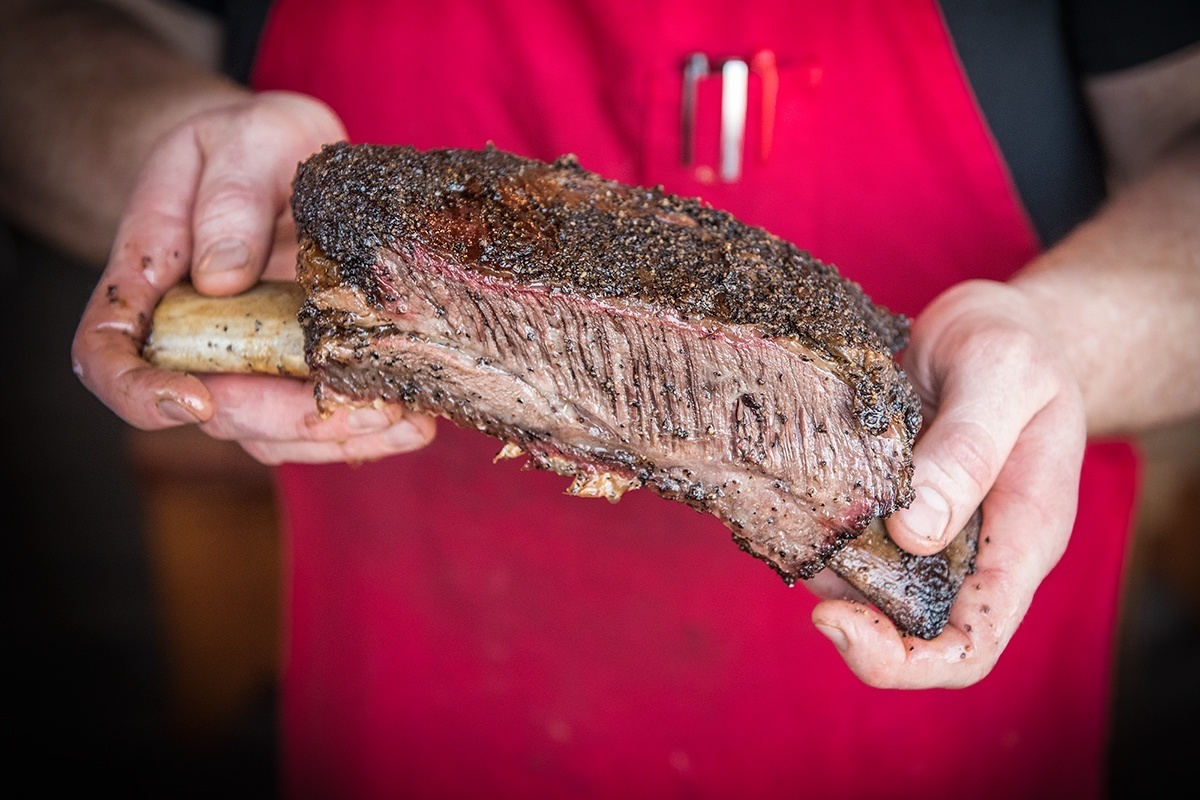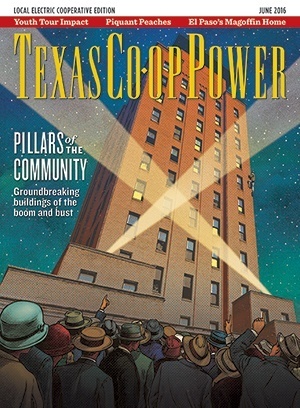From Evie Mae’s Pit Barbecue in Wolfforth to Joe’s Barbeque Company in Alvin, The Original Willie’s Bar-B-Q in Alamo to Stillwater Barbeque in Abilene, beef ribs are winning a foothold in the Texas smoked meats pantheon. Given the size of these ribs and the price tag on them, you could even say they are doing so in a big way.
When it comes to barbecue, Texas, of course, has always been a beef state, meaning brisket rules, and beef sausage has a clear edge over pork. Beef ribs—due mainly to their expense, it turns out—have traditionally been modest sellers and have at times slipped off menus statewide almost entirely. Yet a recent wave of new traditionalists—urban eateries such as Franklin Barbecue in Austin, Pecan Lodge in Dallas and Killen’s Barbecue in the Houston suburb of Pearland—has shown an inordinate interest in beef ribs. The enthusiasm is proving contagious; over the past five or so years, beef ribs have also been turning up more frequently on small-town menus, and for good reason. Silky and sublime, beef short ribs combine gelatinous texture with ambrosial flavor in a manner that makes them unbeatable.
Louie Mueller Barbecue in Taylor has long been ground zero for beef ribs, having served them since launching in 1949. Originally, according to third-generation owner (since 2006) and pitmaster Wayne Mueller, they used beef short ribs cut into thirds, and these items were “almost giveaways, you could hardly sell them at all.” In the early ’80s, Wayne Mueller’s father, Bobby Mueller, switched to chuck short ribs, which had more meat and more bone. But in 2010, after noting that Black’s Barbecue of Lockhart was adding beef ribs to its menu, Wayne Mueller decided to go for broke. He began buying up the biggest plate short ribs he could find, some of them as heavy as 2 pounds, and watched them become “like a new cut of beef that everybody who came in just had to try.” Beautifully marbled like a ribeye steak—no “fatty” and “lean” ends on these babies—their even distribution of fat and collagens keeps them sweetly succulent all the way through. They became Mueller’s signature item.
They also created a financial quandary. Mueller, who subsequently switched to slightly smaller ribs of 1¼ to 1¾ pounds each, pays $15 per pound for them, and sells the smoked meat for $21.99. Thus, a single beef rib usually costs the consumer between $25 and $35, which does not exactly jibe with barbecue’s image as the workingman’s lunch. “What I’m selling them for, I don’t make money on them,” Mueller says, “but people still get sticker shock when they come here to eat. But they also still demand their beef ribs.”
Evie Mae’s, which opened in a trailer just south of Lubbock in Wolfforth early in 2015, had a similar experience when introducing plate short ribs to the region. “I don’t know if nobody here’d ever had them before or what, but we couldn’t give them away at first,” laughs Mallory Robbins, who co-owns Evie Mae’s with her husband, Arnis, and expects to be operating out of a Wolfforth building this year. “Now they’re usually the first thing we run out of every day; people call the day before and try to reserve one. But we still cook only 12 to 20 of them daily, as kind of a loss leader.”
As Rene Lopez Garza, co-owner of Gonzales Food Market, notes, “They sell pretty steady, but you really don’t cook a lot.” Gonzalez puts its beef ribs on the smoker in a pan, so the collected grease bubbles up to lend the bark a crunchier edge.
There is an alternative to beef short ribs, and that’s beef back ribs, a cheaper cut that is more bone than meat. (They are sometimes dubbed “shiners” because the meat is so thin that the bone shows through.) When cooked properly, their meat is tender with a distinct beefy flavor, but that flavor is more one-dimensional compared to the depth and complexity of short ribs. Still, they are easily affordable (costing the restaurateur little more than a buck a pound) and provide a satisfying meal. Eateries such as Cowpokes Bar-B-Q in Pearsall and Joe’s in Alvin swear by them. Original Willie’s gets around the price-point dilemma by offering back ribs on its everyday menu while making short ribs a Tuesday special. It’s becoming increasingly common for barbecue joints to offer beef short ribs as a similar special, or to simply serve them sporadically, when they can get a good price, or on special occasions.
Once Texans try beef ribs, they tend to want more despite the high tariff. As for why that is, Robbins has a theory: “I guess some people have had bad experiences with them, and that’s why they think they don’t like them—but a good beef rib is really, really good.”
——————–
John Morthland wrote about music, food and popular culture for numerous magazines. He died March 8 at home in Austin.


